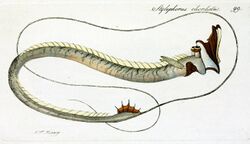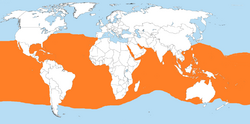Biology:Tube-eye
| Tube-eye | |
|---|---|

| |
| Scientific classification | |
| Kingdom: | Animalia |
| Phylum: | Chordata |
| Class: | Actinopterygii |
| Superorder: | Paracanthopterygii |
| Order: | Stylephoriformes Miya et al. 2007 |
| Family: | Stylephoridae Regan, 1924 |
| Genus: | Stylephorus G. Shaw, 1791 |
| Species: | S. chordatus
|
| Binomial name | |
| Stylephorus chordatus G. Shaw, 1791
| |

| |
The tube-eye or thread-tail, Stylephorus chordatus, is a deep-sea fish, the only fish in the genus Stylephorus and family Stylephoridae.[1][2]
It is found in deep subtropical and tropical waters around the world, living at depths during the day and making nightly vertical migrations to feed on plankton. It is an extremely elongated fish; although its body grows only to 28 cm (11 in) long, its pair of tail fin rays triple its length to about 90 cm (35 in). Its eyes are tubular in shape, resembling a pair of binoculars.[3]
It has a tubular mouth through which it sucks seawater by enlarging its oral cavity to about 40 times its original size. It then expels the water through the gills, leaving behind the copepods on which it feeds.[3]
The phylogenetic position of the tube-eye has been controversial. It has been historically placed amongst Lampriformes, but a study involving mitochondrial and nuclear DNA[4] sequences analysis suggested Stylephorus is instead a close parent of the Gadiformes order (cods and hakes).
References
- ↑ Froese, Rainer, and Daniel Pauly, eds. (2006). "Stylephoridae" in FishBase. February 2006 version.
- ↑ Froese, Rainer and Pauly, Daniel, eds. (2012). "Stylephorus chordatus" in FishBase. April 2012 version.
- ↑ 3.0 3.1 Olney, John E. (1998). Paxton, J.R.. ed. Encyclopedia of Fishes. San Diego: Academic Press. p. 158. ISBN 0-12-547665-5.
- ↑ Miya, M.; Holcroft, N.I.; Satoh, T.P.; Yamaguchi, M.; Nishida, M.; Wiley, E.O.; Masaki Miya; Nancy I. Holcroft et al. (2007). "Mitochondrial genome and a nuclear gene indicate a novel phylogenetic position of deep-sea tube-eye fish (Stylephoridae)". Ichthyological Research 54 (4): 323–332. doi:10.1007/s10228-007-0408-0.
Wikidata ☰ {{{from}}} entry

